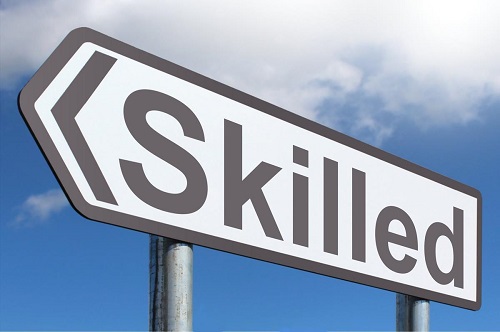If you’re a writer or an English major who aced every spelling and grammar quiz in school, you might think to yourself, “Hey, I’m pretty good with words. I understand punctuation, possessives, and present participles. I would make a fantastic copyeditor!” And you could very well be right. But before you dive headfirst into this profession, it’s important to know that for a good copyeditor, grammatical know-how is just the tip of the iceberg; successful copyediting requires a number of additional skills that have nothing to do with whipping out that red pen to correct a dangling modifier. This post outlines some essential copyediting skills that are completely unrelated to grammar and spelling.
Technological Skills
It’s no secret that bookish types aren’t always the most tech-savvy people. But to make it as a copyeditor in today’s world, you need to be comfortable editing onscreen and using all the modern tools available to you. Microsoft Word is the software application most commonly used by copyeditors. You may think you’re an expert at Word because you’ve used it for schoolwork and basic word processing for your entire life, but once you dive into the “Track Changes” settings, you’ll find a whole world of editing tools that you might not be so familiar with. There are plenty of useful tutorials out there on how to use Track Changes in Word (this one, for example, provides a very basic introduction), and all copyeditors should spend some time poking around in Word and familiarizing themselves with all the features that might be helpful to them. These include the bookmarking feature, which makes long documents easier to navigate, and macros, which automate certain copyediting tasks to increase efficiency.
Though Word is the most common choice, copyeditors may be required to use other software—for example, they may need to edit PDFs using Adobe Acrobat. Copyeditors also need to know how to open, save, and back up different types of files and convert between file formats.
Organizational Skills
In order to stay on top of all the different files they work with, copyeditors need to be extremely organized. A huge part of the job is version control—a manuscript (or any other document subject to editing) needs to be saved at each stage of the editorial process, and these different versions need to be kept track of. To avoid mistakenly sending an out-of-date version to an author or designer, copyeditors need to develop a foolproof system of folders and file-naming conventions.
In addition to practicing file organization and version control, copyeditors also need to exercise strong organizational skills in other areas. For example, they must keep track of deadlines and production schedules (yes, this will likely involve spreadsheets), be methodical in their use of style sheets, and maintain an organized inbox for professional correspondence.
Communication and People Skills
Though copyediting might seem like a solitary endeavor for introverted bookworms, the truth is that it’s an inherently collaborative and social profession. You’re working on other people’s writing, after all. Being a good editor therefore requires effective communication with authors, whether that’s through queries, editorial notes, emails, or phone calls. Striking the right tone with a client—authoritative enough that they trust your judgment, but also sufficiently respectful and flexible—is practically an art form, and it can take years to develop one’s professional voice as a copyeditor.
In addition to being diplomatic in your interactions with clients, you may also need to navigate relationships with managing editors, other supervisors, and colleagues. Networking is a tremendous part of the work, especially if you’re a freelancer, and all copyeditors will need to have some tricky conversations about pay and other business matters from time to time. For these reasons, a certain amount of social aptitude and professional polish—in addition to technological proficiency and organizational skills—will likely be more helpful to an aspiring copyeditor than even the most impressive sentence-diagramming abilities.
So, word nerds and grammar gurus of the world—do you have what it takes?

